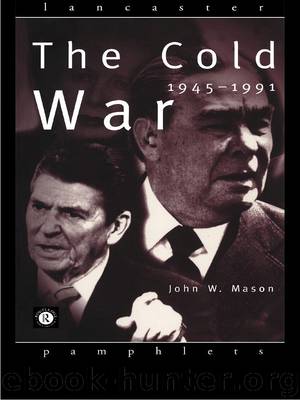The Cold War by Mason John;

Author:Mason, John; [JOHN W. MASON]
Language: eng
Format: epub
Publisher: Routledge
Published: 2011-07-31T16:00:00+00:00
The United States’ misadventure in Vietnam: an interpretation
Even before the collapse of South Vietnam on 30 April 1975 the debate over Vietnam within the United States had concluded. For at least the last five years of the United States’ involvement in Vietnam barely a voice was raised in defence of further participation in the war. The critics of the war had won the argument. Vietnam had become the symbol of a mistaken foreign policy, an example of what has been called ‘the arrog-ance of power’. The more extreme critics saw United States involvement in Vietnam as an evil comparable to the evils committed by Nazi Germany. One such critic, the US writer Frances Fitzgerald, wrote that the effects of United States bombing were ‘indistinguishable’ from genocide. The anti-war critics had won all the political and moral arguments.
In fact it is not difficult to see how the United States got involved in Vietnam. The success of its containment policy in Europe in the later 1940s led it to think that the same policies would work in South-east Asia in the 1950s and 1960s. Korea was the link between the two. The United States defended South Korea in 1950 against what it saw as a worldwide communist conspiracy. Imbued with the idea that communism was monolithic, Washington’s policy-makers failed to see that Vietnam was an independent communist state. Many of the Vietnamese communists were nationalists before they became communists, and at no time were they mere agents of either the Soviet Union or China. Therefore, the professed American war aim, ‘to stop communism’ in South Vietnam, revealed itself as an empty slogan. Since Vietnamese communism was not controlled by the Soviet Union or China, the fate of South Vietnam was not relevant to the containment of Soviet or Chinese communism.
Robert McNamara was the Secretary of Defense under Presidents Kennedy and Johnson and helped to lead the United States into Vietnam. Indeed, Vietnam was often called ‘McNamara’s war’. Thirty years later, in a book entitled In Retrospect: The Tragedy and Lessons of Vietnam, he wrote a candid inside account of the errors of judgement that landed the United States in an unwinnable war. McNamara cited two contradictory premises that governed policy in the Kennedy years and were never thoroughly examined. One was that the fall of South Vietnam to communism would threaten the security of the United States. The second was that only the South Vietnamese could defend their own country and therefore Washington should limit its support to providing military training and economic aid.9
McNamara admitted to seeing communism in Vietnam as related to guerrilla insurgent movements in Burma, Indonesia, Malaya and the Philippines in the 1950s. These conflicts were not seen as nationalist movements, but as part of a concerted communist drive for hegemony in Asia. In the 1940s in Europe, the United States recognised Yugoslavia under Tito as a communist nation independent of Moscow. In the 1960s the United States viewed Ho Chi Minh not as a South-east Asian Tito but as another Fidel Castro, operating within the Soviet/Chinese communist orbit.
Download
This site does not store any files on its server. We only index and link to content provided by other sites. Please contact the content providers to delete copyright contents if any and email us, we'll remove relevant links or contents immediately.
| Africa | Americas |
| Arctic & Antarctica | Asia |
| Australia & Oceania | Europe |
| Middle East | Russia |
| United States | World |
| Ancient Civilizations | Military |
| Historical Study & Educational Resources |
Cecilia; Or, Memoirs of an Heiress — Volume 1 by Fanny Burney(32068)
Cecilia; Or, Memoirs of an Heiress — Volume 3 by Fanny Burney(31463)
Cecilia; Or, Memoirs of an Heiress — Volume 2 by Fanny Burney(31413)
The Secret History by Donna Tartt(18188)
Sapiens: A Brief History of Humankind by Yuval Noah Harari(13994)
Leonardo da Vinci by Walter Isaacson(12810)
The Radium Girls by Kate Moore(11627)
Sapiens by Yuval Noah Harari(5125)
How Democracies Die by Steven Levitsky & Daniel Ziblatt(4966)
The Wind in My Hair by Masih Alinejad(4850)
Homo Deus: A Brief History of Tomorrow by Yuval Noah Harari(4692)
Endurance: Shackleton's Incredible Voyage by Alfred Lansing(4513)
Man's Search for Meaning by Viktor Frankl(4295)
The Silk Roads by Peter Frankopan(4275)
Millionaire: The Philanderer, Gambler, and Duelist Who Invented Modern Finance by Janet Gleeson(4108)
The Rape of Nanking by Iris Chang(4024)
Hitler in Los Angeles by Steven J. Ross(3803)
The Motorcycle Diaries by Ernesto Che Guevara(3790)
Joan of Arc by Mary Gordon(3790)
